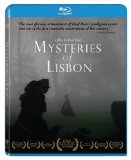| Reviews & Columns |
|
Reviews DVD TV on DVD Blu-ray 4K UHD International DVDs In Theaters Reviews by Studio Video Games Features Collector Series DVDs Easter Egg Database Interviews DVD Talk Radio Feature Articles Columns Anime Talk DVD Savant Horror DVDs The M.O.D. Squad Art House HD Talk Silent DVD
|
DVD Talk Forum |
|
|
| Resources |
|
DVD Price Search Customer Service #'s RCE Info Links |
|
Columns
|
|
|
Mysteries of Lisbon
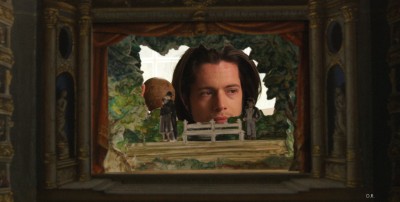
Please Note: The images used here are promotional stills and are not taken from the Blu-ray edition under review.
What a fitting, masterful close to an illustrious, impassioned, and cheeky career is the late Raúl Ruiz's last film, Mysteries of Lisbon! The expatriate Chilean filmmaker, who left his homeland after the fascist Pinochet coup in 1973 and worked in Europe over the latter part of his career until his death last year, had a filmography comprising more than 100 movies, and this film fortuitously has all the confident ambition and accomplishment it needs (and then some) to feel like a summation and a peak. It is as huge and teeming with life as one of the thicker Charles Dickenses or Victor Hugos (and was, in fact, adapted from a long 1854 novel by Camilo Castelo Branco, a sort of Portuguese counterpart to those authors), but for all its 19th-century hyper-extensiveness of plot, it never for a moment loses its intoxicating, addictive air of cinematic elegance. Ruiz was no stranger to tackling the daunting, oft-misunderstood task of somehow re-creating a novel as a film; one of his best-reviewed (and probably his most widely known) works was Time Regained (1999), which saw him successfully, miraculously pulling it off with no less than Proust as his "unfilmable" challenge. All the more or less successful movie versions of Les Misérables aside, though, Proust's free-associative, digressing density of prose may make for an easier translation into film language than a novel of Mysteries of Lisbon's sprawling, character- and plot-dense, pre-modernist, whole-world-in-a-book ilk, and the ingenuity and artistry with which Ruiz solves the many problems presented by such a proposal is even more wondrous to behold.
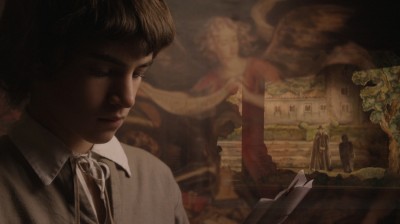
The story's elaborate, excessive labyrinth of coincidences, disguises, mistaken identities, forbidden love, abandoned children, intercepted love letters, and nobly tragic retreats into monasteries and/or nunneries does have a sort of center in the form of Father Dinis (Adriano Luz) and the adolescent orphan in his care, Joao (Joao Arrais), whose given name, we later learn, is Pedro. The film's first "mystery" is who Joao/Pedro's parents were, and Father Dinis--who seems to know everyone and everything, and is the film's primary repository of secrets, so many that it's a wonder he ever has time to take confessions or perform christenings--not only knows but was intimately involved with the tragic story that led to Joao/Pedro's mother, from a money-strapped blueblood family, giving up her child, who born of passion but out of wedlock, and entering into a loveless marriage of aristocratic alliance to end up the prisoner in the cold mansion outside of town where Father Dinis eventually takes her son to discover where he came from. The film is both an amazingly well-told story and a contemplation of the cycle of desire that gives rise to the creation and consumption of narratives, so it is significant that it is the dissatisfied, outcast teenaged orphan's persistent inquiries addressed to Father Dinis--which have the clear connotation of the classic child's "tell me a story" plea--that leads into the film's enacted unfolding of the events that the priest finally agrees to relate, which is only the first link in a chain of more and more far-ranging mysteries--more questions, more stories that demand to be told, including the priest's discovery of his own murky origins (and the unfolding revelation of the shocking number of different parts he has played in many of the characters' stories) and the tales of characters who, like the half-mercenary, half-beneficent gypsy (Ricardo Pereira) hired by Joao/Pedro's mother's father to kill the bastard child at birth, are much less peripheral than they initially seem, with their own mysteries to solve and stories to tell and have told to them in turn as the film's narrative web is woven ever wider.
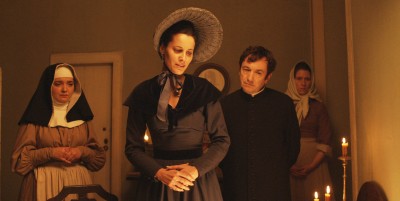
Everyone from Douglas Sirk to Pedro Almodovar knows that the only way to cinematically approach a story that necessitates constructions like "Pedro's mother's father" in its telling is with some measure of self-conscious artifice, but "measured" ill describes the way that Ruiz, screenwriter Carlos Saboga, and cinematographer André Szankowski go about it; they don't just accept the artificiality of the story, they embrace it with a passion. Their framing symbol is a miniature toy theater--a little stage, balconies and seats for the audience spreading out on either side, on which paper-doll figures on sticks are introduced and manipulated--owned by Joao/Pedro and present in his room no matter where or at what age we re-find him among the film's other criss-crossing stories. For those who have seen Bergman's Fanny and Alexander, imagine that film's similar child-with-a-toy-theater device, not as an indicative part of his world, but instead drawing us down into the theater to watch his imagings, inspired by all the grown-up novels he's just started to read, played out before our eyes (all the sumptuous beauty, care, and attention to every detail still present to the same extent as they are in Bergman's gorgeous work) and you'll have some idea of what Ruiz and co. are up to here.
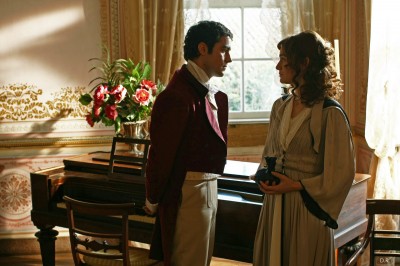
This miracle-working creative team, with the aid of Ruiz's ingeniously choreographed blocking, also manages to attain a simultaneous awe-inspiring fluidity of the camera (which, it seems, can float freely from space to space and through walls) and extremely finely composed, painterly mise-en-scène that at times evokes Peter Greenaway's heightened processionals of pageantry. Perhaps the film's loveliest dovetailing of story, theme, and technique is in Ruiz's constant placement of principal characters inside little frames--doors, windows, curtains, etc.--within the larger frame of the shot, very often with interlopers like maids, colleagues of the main characters, or passers-by placed between us and the frame-within-a-frame, surreptitiously listening and/or looking in on the main characters like a story-hungry audience, becoming both our onscreen counterparts and an additional visual layer in what we ourselves are the audience for. This is a brilliantly concise (not to mention ravishingly symmetry-imposing) image of what lies at the heart of this film, with its narratives inside other narratives that reveal still more narratives to come in a dizzying telescope effect that cumulatively suggests an encouraging plenitude, a warm optimism about the everlasting desire to tell and be told stories.
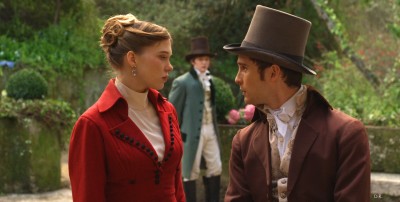
There is an inescapable self-reflexiveness that comes along with Mysteries of Lisbon's degree of self-consciousness, but again, Ruiz embraces and revels joyfully in it; it's virtually 180 degrees from the Brechtian sort of self-reflexiveness, with its debunking intentions, alienation effects, and (perfectly valid) doubts about storytelling. Ruiz knows full well that what he's gifting to us is not a "reflection" of reality, or even realistic; it is nothing less than the sheer pleasure of a dream one had thought sadly lost upon awakening, some elaborate and irrational fiction that's been resuscitated and replayed with magical precision. But neither does the paradoxical coexistence of wonder and melancholy in his eminently skilled, ravishing invention escape Ruiz's tender but wise sensibility; the impossibility of the stories we want to escape into, their inevitable ending no matter how long we would like to prolong them, are never far enough away that the film becomes mere escapism. Mysteries of Lisbon is, in other words, large enough to contain multitudes; it is indulgent but fastidiously so, almost terminally romantic in both plot and style but never sentimental. It is that rare sort of passionate, intelligent, serious fun that offers sheer entertainment and real edification without one comprising the other; it has its cake and eats it too, and the experience is delicious in every way.
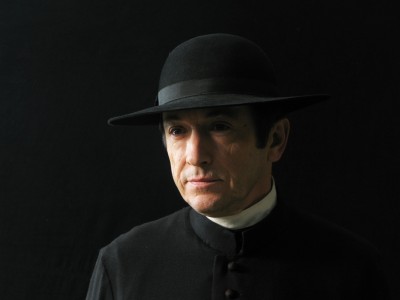
THE BLU-RAY DISC:
The fact that the film was originated on high-definition digital video surely didn't hurt the ease of transition onto digital media, but this beautiful transfer--an AVC/MPEG-4 file mastered in 1080/24p and presented at an anamorphic 1.85:1 aspect ratio--is both as crystal-clear and vibrant as that media allows for and retains, with no noticeable artifacting, the surprising variation in depths of field that Ruiz and cinematographer André Szankowski have attained. It looks magnificent.
Sound:The soundtrack--in Portugese and French with optional English subtitles, with a Dolby Digital 2.0 option in addition to the preferred 5.1 soundtrack--has been just as conscientiously attended to as the video, with full, deep, rich, resonant sound that lets the film's most exquisite highs and deepest lows (both experienced most overtly in Jorge Arriagada and Luis Freitas Branco's string-laden score) emanate with incredible clarity.
Extras:Music Box has generously loaded up this collector's edition Blu-ray release of Mysteries of Lisbon with an entire third disc of extras, including:
--A 40-minute interview with director Raúl Ruiz conducted for the French TV series "CinéCinéma," which is nothing short of a treatise on directing that should be required viewing for any film student. The master explains, for example, his avoidance of close-ups as a technique for rendering Mysteries of Lisbon's serial/soap narrative structures something more cinematic than televisual. He also goes into the "modern" effect elicited from the clash that occurs when traditional theatrical staging is used in front of a movie camera, as well as his use of Panavision's "Genesis" digital video camera on the project, his childhood exposure to Hawks and Hitchcock in the Chilean village where he grew up, and numerous other topics of directly relevant interest, making for a truly valuable supplement to the main feature.
--A brief interview with screenwriter Carlos Saboga offers some juicy tidbits on the origins of the project and his process of adapting Camilo Castelo Branco's novel, with its nesting, "Russian doll-like" structure, for Ruiz (with plenty of on-set retooling by the director, which Saboga happily and gratefully acknowledges).
--A more intimate half-hour radio interview with Ruiz conducted for French radio at the director's home, in his library (he confesses to being a "bibliomaniac"), contains his further and deeper contemplations on the history and aesthetics of (and his own tastes in) literature and cinema, including thoughts on temporal duration in period films and his resultant dislike of Shakespeare in Love because "it felt like Shakespeare should have had a mobile phone."
--A 15-minute critics' roundtable discussion of Mysteries of Lisbon featuring four or five newspaper critics on French television (rightly) praising the film to the skies. The passion, erudition, and depth these folks are not just allowed but encouraged to display--on television!!--(and I'm talking excited, enthusiastic, minutely observant onscreen formal analyses of sequences and clips excerpted from the film and brought by the critics for their run-down) make any American equivalent look paltry and frivolous by comparison. This is Exhibit Z in the case that the French take cinema infinitely more seriously than...well, than virtually anyone else, really, but definitely more than us Américains.
--A 15-minute segment on the novels of Mysteries of Lisbon author Camilo Castelo Branco from a Portuguese television culture program, featuring a distinguished Portuguese literary expert (unidentified here, alas) and actress Maria Joao Bastos, who played the mysterious mother of Joao/Pedro in the film.
--The film's U.S. theatrical trailer.
--An enclosed 10-page booklet containing a written introduction by Ruiz and an essay on Ruiz and Mysteries of Lisbon by the great American critic Jonathan Rosenbaum.
FINAL THOUGHTS:Not many four-and-a-half-hour period pieces would allow you to get lost in them the way Mysteries of Lisbon does; its overlapping, ripple-effect stories, copious and interconnected in the style of the 19th-century novel from which they're taken, together create a cinematic whirlpool whose pull is irresistible. But it doesn't stop there. It also manages to extend bounteous, ravishingly eloquent opportunities for reflection on the experience of telling and being told stories; director Raul Ruiz offers so many ways of seeing and marveling at all of the multitudinous layers of his creation at once, it's like seeing the act of storytelling in cross-section, being inside and outside of it at the same time. It is a shame that Ruiz's career, though already extensive (so very few of his films are available in North America relative to how many he made!) was ended by his sad death last year, but Mysteries of Lisbon is a picture that any filmmaker would be proud to have as their final work and crowning achievement. It is a towering masterpiece and a film that will guarantee Ruiz's place in the pantheon, and thus monumental in both senses of the word. Highly Recommended.
|
| Popular Reviews |
| Sponsored Links |
|
|
| Sponsored Links |
|
|
| Release List | Reviews | Shop | Newsletter | Forum | DVD Giveaways | Blu-Ray | Advertise |
|
Copyright 2024 DVDTalk.com All Rights Reserved. Legal Info, Privacy Policy, Terms of Use,
Manage Preferences,
Your Privacy Choices | |||||||









